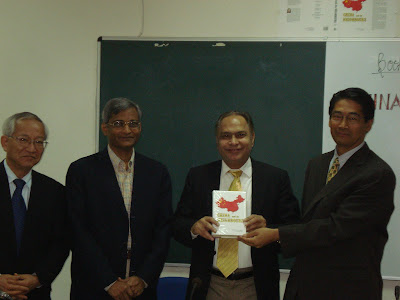
In his opening remarks Mr Ito mentioned that this book is a novel effort in bringing together Indian and Japanese scholars in writing about different foreign policy themes of China and its neighbours. The Minister for Political Affairs further congratulated the team for having seen through the project which began with the first draft discussion among the scholars in November, 2008 at India International Center, New Delhi.
Chairing the session was Prof. Y.K.Tyagi, (Dean of School of International Relations) who in his opening remarks congratulated the efforts made by the editors and suggested that students at the Center for East Asian Studies must contribute a critical review of this book to the School’s journal International Studies. He further added that students doing so will be encouraged with remuneration for doing so.
Prof. Srikanth Kondapalli provided an overview of the project details and explained the importance of China and its relation with its neighbours in the context of the China's rise and the multifarious changes that occurred in the neighbourhood. Not only that China had been posting high economic growth figures in the last two decades, but it is also engaged in a mutually beneficial relationship with several neighbours. Stability is one of the foremost concerns for China.
Prof Horimoto in his intervention had mentioned about the Japanese Ministry of Education research grants to look into more closely the South Asian dynamics and its relations with major powers, including China. At the academic level, this is an area worth exploring further. Dr Vyjayanti Raghavan, Associate Professor in Korean language at the School of Languages, JNU, had provided for the main themes in the Korean Peninsula’s interactions with China, viz., diplomatic normalization, enhancing trade and investments, nuclear stability, etc. Dr. Jaganath Panda, Researcher at Institute of Defence Studies and Analysis who has contributed an article on the theme of China and its relations with South Asia mentioned that while it is easy to articulate what South Asia thinks about China and its rise, accounting for what China thinks about South Asia is not easy. S. Rajasimman, Research Scholar at Center for East Asian Studies mentioned that the central theme of his contribution on China-ASEAN relations was that the variable of “non-intervention” is a crucial determinant in the relation between the two.
Rapporteur: S. Rajasimman
Photograph: Rajiv Ranjan
{In picture: Prof. Takenori Horimoto, Prof. Srikanth Kondapalli (editor), Prof Y.K.Tyagi (Dean, SIS) and HE Naoki Ito (Minister for Political Affairs, Embassy of Japan at New Delhi) (Left to Right)}
No comments:
Post a Comment
Comments should not be derogatory, offensive or excessively aggressive. Please keep this forum civilised.